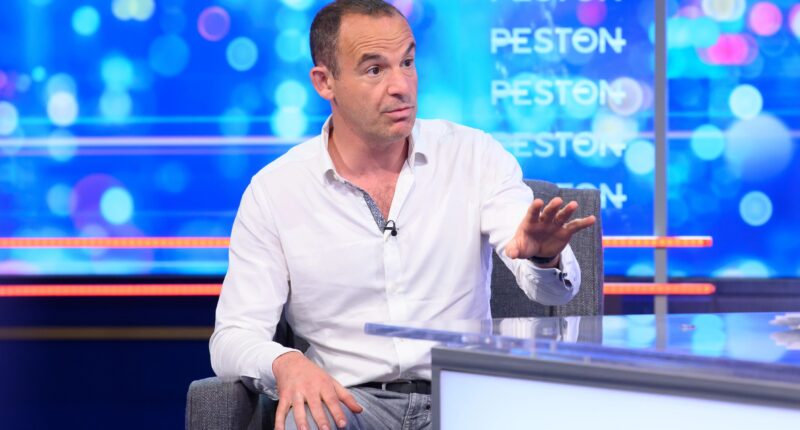MARTIN Lewis warns first-time buyers over a new zero deposit mortgage.
In the latest Martin Lewis Podcast, the MoneySavingExpert explains how Skipton Building Society’s new 100% mortgage works.
The Track Record Mortgage was launched on Tuesday (May 9) and is available to tenants aged 21 and above and for first-time buyer purchases only.
The five-year fixed rate, which is available to borrowers needing a 100% loan, is fixed at 5.49%.
Martin said: “It’s the first one of the 100% mortgages that don’t require a guarantor’s backing.
“The others have had you had usually your parents or somebody put some money in so that you’re able to get a mortgage of this level.


“Now the big key to this, and it’s only open for first-time buyers aged 21 or above, is that normally when you apply for a mortgage, the maximum amount you can borrow is based on income and outgoings and the lender’s specific arbitrary affordability calculations.
“Typically it’s roughly your salary multiplied by four or four and a half with a lot of other things in.
“But with Skipton’s 100% mortgage, the amount you can borrow is not allowed to be more than the equivalent of what you pay in each month in rent.
“In other words, if you pay £1,000 a month on rent, you’re Skipton 100% mortgage couldn’t cost you more than the equivalent of £1,000 a month either.”
Most read in Money
The mortgage was launched after Skipton’s own research exposed how 80% of tenants feel “trapped” in the rental cycle, paying rents that are higher than a mortgage.
Martin said that while this is an interesting concept – the idea of this mortgage is that it is there to solve the issue of renters not being able to save up enough cash for a deposit.
He said: “As someone who’s campaigned for years to help mortgage prisoners locked in at hideous unaffordable rates – I have to say that when I first heard the spectre of 100% mortgages were turning did leave me with somewhat mixed feelings.
“Years of property pawn TV shows have spouted the idea that you’ve got to buy a house as soon as possible – it has to be as big as possible, you got to push as hard as possible…
“Whereas for me the real priority is not to overstretch your finances. Before the 2007 Financial Crisis, banks would usually chuck money out to anyone walking past their window to get a mortgage.
“So for me, Skipton’s criteria of requiring a good rental track record to prove someone can make mortgage payments is sensible.
“But you’ll still get a far cheaper mortgage rate if you find enough money to scrape together for a deposit.”
How do 100% mortgages work?
A 100% mortgage helps those struggling to raise enough cash for a deposit to get on the property ladder.
These allow buyers to purchase a home without paying a deposit – but they can come with extra fees.
This differs from most standard mortgage deals which require the borrower to put down at least a 5% deposit.
Since the 2008 Financial Crash, lenders have become a lot stricter when it comes to offering 100% mortgages.
Before Skitpon launched its new Track Record Mortgage borrowers could only choose from a handful of niche 100% loan-to-value guarantor or family deposit mortgages.
With a guarantor mortgage, a parent or close relative agrees to guarantee your mortgage repayments if you can’t repay what you owe.
A family deposit mortgage works in a different way and asks a relative of the borrower to deposit a set amount of cash in a designated savings account to cover some of the home’s value.
What are the pitfalls of 100% mortgages?
While 100% mortgages tend to look great for first-time buyers looking to get on the property ladder – there are still a number of pitfalls.
These mortgages are usually more expensive because they require no upfront deposit.
The best mortgage rates tend to be most available to those with high deposits.
Those who take out a 100% mortgage also run the risk of slipping into “negative equity”.
This is where your property becomes worth less than the amount you’ve borrowed against it – but longer mortgage terms can help reduce the risk of this.
Tips for getting the best mortgage deal
If you’re looking for a traditional type of mortgage instead, getting the best rates depends entirely on what’s available at any given time.
But there are several ways to land the best deal.
Usually the larger the deposit you have the lower the rate you can get.
If you’re remortgaging and your loan-to-value ratio has changed this could also give you access to better rates than before.
A change to your credit score or a better salary could also help you access better rates.
If you have a fixed rate, you could see higher rates when you come to the end of the current term after the BoE rise rises.
And if you’re nearing the end of a fixed deal soon it’s worth looking for new deals now.
You can lock in current deals sometimes up to six months before your current deal ends.
Leaving a fixed deal early will usually come with an early exit fee, so you want to avoid this extra cost.
But depending on the cost and how much you could save by switching versus sticking, it could be worth paying to leave the deal – but compare the costs first.
To find the best deal use a mortgage comparison tool to see what’s available.
You can also go to a mortgage broker who can compare for you, but you may have to pay for this service.
It could cost a couple of hundred pounds but it might save you thousands on your mortgage overall.
You’ll also need to factor in fees for the mortgage, though some have no fees at all, or you can add it to the cost of the mortgage, but beware that means you’ll pay interest on it and so will cost more in the long term.
You can use a mortgage calculator to see how much you could borrow.


Remember, that you’ll have to pass the lender’s strict eligibility criteria too, which will include affordability checks, and looking at your credit file.
You may also need to provide documents such as utility bills, proof of benefits, your last three month’s payslips, passports and bank statements.










